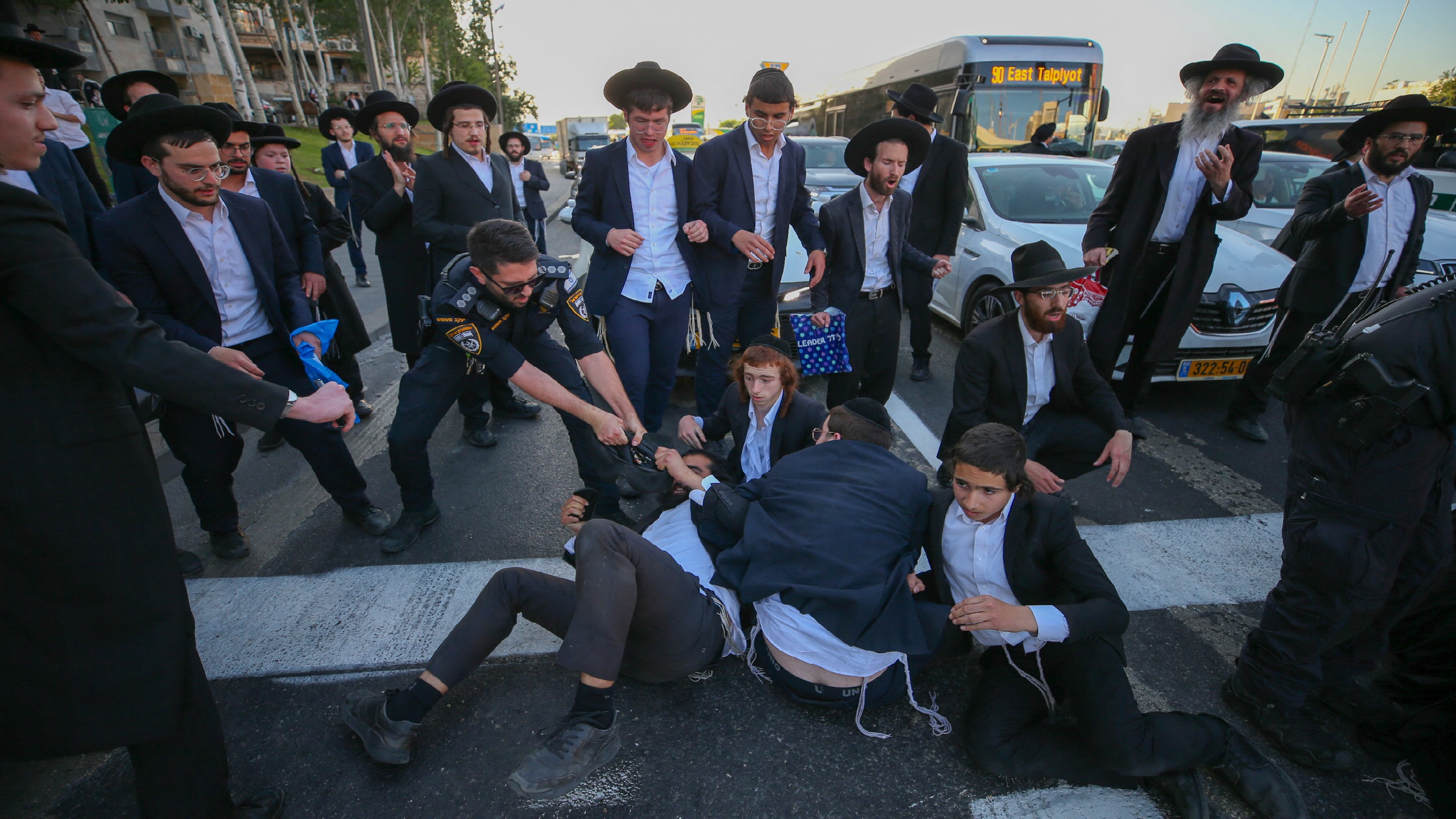Old Bill, New Debate: Contentious Ultra-Orthodox Military Exemption Bill Returns to Knesset
Both Haredi and secular Israelis are dissatisfied with the proposal, which was first introduced before the current war
The Knesset agreed on Tuesday to reopen a debate on a contentious bill that would lower the age of exemption from military service for ultra-Orthodox, or Haredi, men. In its current form, the bill would lower the ultra-Orthodox exemption age from 26 to 21 and gradually increase enlistment rates. Experts estimate that the law would result in the enlistment of about 3,500 Haredi men each year out of 13,000 potential conscripts, up from the 1,200 to 1,300 who currently enlist each year.
The measure to bring the bill back to the Knesset floor for debate passed by a narrow 63-57 vote. The bill was originally introduced in 2022, long before the current war in Gaza and escalating conflict in northern Israel; it was intended to offer a compromise that would satisfy both secular members of Prime Minister Benjamin Netanyahu’s coalition and Netanyahu’s ultra-Orthodox allies. In practice, the bill ended up satisfying neither group.
Yuval Shany, an international law professor at Hebrew University and senior fellow at the Israel Democracy Institute, told The Media Line that the broad military exemption for Haredim has become politically untenable given Israel’s growing military needs.

Prof. Yuval Shany, the Hersch Lauterpacht Chair of Public International Law at the Hebrew University of Jerusalem. (Courtesy)
The crisis around the draft law could very well bring down the government
“The crisis around the draft law could very well bring down the government, since some members of the coalition would not be able to support a broad exemption law in the final reading, and true ultra-Orthodox parties might not be able to stay in a government that revokes the broad exemption,” he said.
The bill also provides strong incentives for Haredi men to join the job market, Shany said. According to Israel’s Central Bureau of Statistics, about 45% of Haredi men do not work.
Give the gift of hope
We practice what we preach:
accurate, fearless journalism. But we can't do it alone.
- On the ground in Gaza, Syria, Israel, Egypt, Pakistan, and more
- Our program trained more than 100 journalists
- Calling out fake news and reporting real facts
- On the ground in Gaza, Syria, Israel, Egypt, Pakistan, and more
- Our program trained more than 100 journalists
- Calling out fake news and reporting real facts
Join us.
Support The Media Line. Save democracy.
Dr. Shai Stern, a law professor at Bar Ilan University and deputy chairperson at the Haredi Institute for Public Affairs, said that secular Israelis see the bill as an opportunity to make service in the military a precondition for equal citizenship.
“On the practical level, there are growing security needs and not enough warriors, which is becoming a heavier burden for seculars, especially those serving in reserve duty,” he told The Media Line.
Haredi Israelis, on the other hand, see the bill as an attempt to devalue Torah study as a national value and to compel the ultra-Orthodox to accept liberal norms, Stern said. He noted that 50% of youth from the religious Zionist movement—a less strictly observant branch of Judaism—have become secular, compared to 14% of Haredi youth. “The Haredim blame this difference on the army forcing integration,” Stern said.
Both Stern and Shany characterized the bill as a broadly unpopular compromise.
“It seems that the Haredim are on the losing side of this battle, because if the law goes as it is, there is a good chance the coalition will be over,” Stern said. “If this government is over, there is a big chance that a new law, even more demanding of the Haredim, might be proposed in a potential new Knesset and government. But if you look at the polls, no side in Israeli politics can form a government without the Haredim’s support.”
Shany said that the question of Haredi enlistment would further inflame tensions between Netanyahu and Israel’s Supreme Court.
“Judges expressed outrage with the minimalist approach of the government to drafting the ultra-Orthodox, and a judgment ordering it to start drafting more is imminent,” he explained.
Starting in 2023, Netanyahu and his supporters have attempted to pass a series of controversial laws meant to reduce the strength of Israel’s judiciary. Shany said that part of the motivation behind pursuing the judicial reforms was the attempt to prevent the judiciary from blocking legislation that favors the Haredi community.
“However, the judicial reforms were stopped,” Shany said. “At this point, the Haredi situation is no longer tenable.”
After the October 7 events, the ultra-Orthodox society is becoming more and more aware of Israel’s security needs
Increased mandatory enlistment of ultra-Orthodox Israelis may be inevitable, but the ultra-Orthodox themselves might also be softening their opposition to the idea. “After the October 7 events, the ultra-Orthodox society is becoming more and more aware of Israel’s security needs,” Stern explained.



